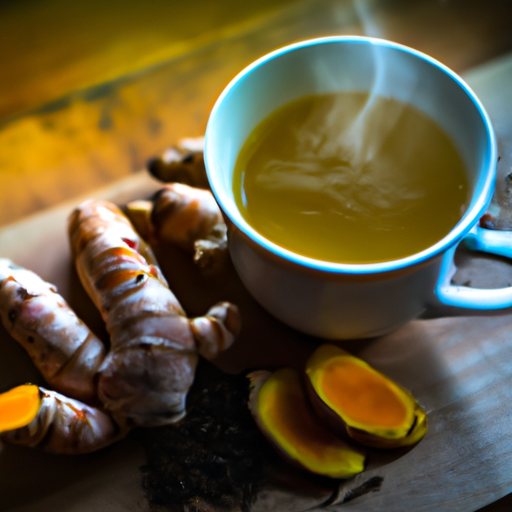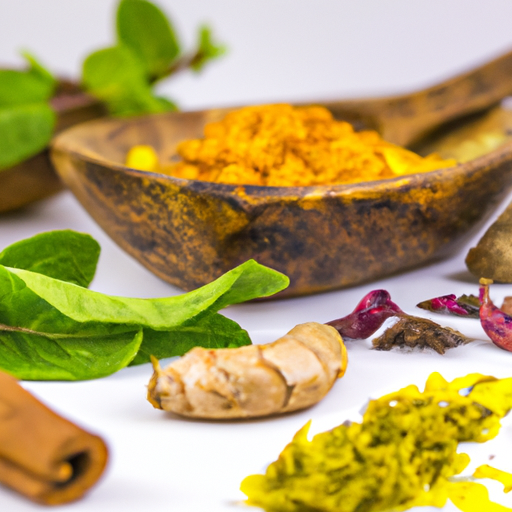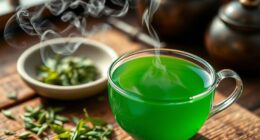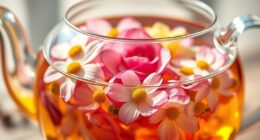I have always been intrigued by the advantages of using natural remedies, and ginger turmeric tea has recently piqued my interest. I have come across numerous assertions about the health benefits associated with these two spices, prompting me to delve deeper into the potential benefits that ginger turmeric tea may offer.
Ginger and turmeric have both been used for thousands of years in traditional medicine, and their properties are well-known. Ginger can help with digestion and reduce inflammation, while turmeric has antioxidant and anti-inflammatory effects. Together, they make a powerful combination that can have a number of health benefits.
In this article, I’ll explore the origins and history of ginger turmeric tea, as well as the digestive, immune-boosting, pain relief, brain health, cardiovascular, and skin health benefits that it can provide. Plus, I’ll share some tips on how to prepare this tasty and healthy tea.
Key Takeaways
- Ginger and turmeric are rich in antioxidants and anti-inflammatory compounds that can boost immunity, reduce oxidative stress, and improve brain function.
- Drinking 1-2 cups of ginger turmeric tea per day is recommended for optimal health benefits, but excessive consumption should be consulted with a healthcare professional.
- Ginger turmeric tea can provide natural pain relief, improve memory and cognitive function, and have positive effects on heart and skin health.
- Proper preparation of ginger turmeric tea is important to fully enjoy its health benefits, and it can be customized with different flavor combinations to make a delicious and natural addition to a daily routine.
Origins and History of Ginger Turmeric Tea
You’ll be amazed to learn the fascinating history and cultural significance behind the creation of ginger turmeric tea! For centuries, ginger and turmeric have been used in both Ayurvedic and Chinese medicine to treat a variety of ailments.
Ginger, native to China and India, was initially used for its medicinal properties, including relief from nausea and inflammation. Meanwhile, turmeric, which originated in India, was used for its anti-inflammatory properties and as a natural pain reliever.
The combination of these two powerful ingredients in a tea form has been a staple in traditional medicine for centuries. In India, ginger turmeric tea, also known as ‘haldi chai,’ is a cultural staple and is often served to guests as a sign of warmth and hospitality.
This tea is not only known for its medicinal properties but also for its cultural significance, making it a popular beverage in many households. With the rich history and cultural significance of ginger turmeric tea, it’s no wonder why it has become a go-to beverage for those seeking natural remedies.
Now, let’s delve into the properties of ginger and turmeric, and how they work together to provide numerous health benefits.
Properties of Ginger and Turmeric
Combining these two powerful roots brings a fiery zest to your beverage that ignites a multitude of health benefits. Ginger and turmeric have been used for centuries in traditional medicine, and their properties complement each other perfectly. Here are some of the nutritional and culinary uses of ginger and turmeric:
-
Ginger is rich in antioxidants and anti-inflammatory compounds, such as gingerols and shogaols. It also contains vitamin B6, magnesium, potassium, and manganese. These nutrients support the immune system, reduce oxidative stress, and improve brain function.
-
Turmeric is a potent anti-inflammatory agent due to its active ingredient, curcumin. It also has antioxidant, antimicrobial, and anticancer properties. Turmeric is a source of iron, vitamin C, and dietary fiber. It aids digestion, promotes heart health, and reduces joint pain.
-
Ginger and turmeric have a pungent, spicy flavor that adds depth to savory and sweet dishes. They are used in various cuisines, such as Indian, Thai, and Caribbean. Ginger is commonly used in teas, stir-fries, and marinades, while turmeric is used in curries, rice dishes, and smoothies.
-
Ginger turmeric tea is a popular beverage that combines the benefits of both roots. It can boost immunity, relieve inflammation, ease nausea, and improve digestion. It also has a warming effect on the body, which is why it is a common remedy for colds and flu.
By incorporating ginger and turmeric into your diet, you can reap numerous health benefits.
In the next section, we’ll explore how ginger turmeric tea can help with digestive issues.
Digestive Benefits
Indulging in a cup of this zesty beverage can work wonders for your digestive system. Ginger and turmeric have been used for centuries to treat gastrointestinal issues. Ginger has anti-inflammatory properties that can soothe the digestive tract, while turmeric can stimulate bile production, aiding in the breakdown of fats.
Here is a table summarizing some of the digestive benefits of ginger and turmeric:
| Benefit | Ginger | Turmeric |
|---|---|---|
| Relief from nausea and vomiting | X | X |
| Reduction in bloating and gas | X | X |
| Improved digestion | X | X |
| Prevention of ulcers | X | X |
| Protection against foodborne illnesses | X |
Healthy digestion is crucial for overall gut health. When our digestive system is working properly, we are able to absorb all the necessary nutrients from our food, while eliminating waste efficiently. This can help boost our immune system by providing the necessary nutrients for our body to function at its best. So, not only can ginger turmeric tea aid in our digestive health, but it can also provide immune-boosting properties.
Immune-Boosting Properties
Boost your immune system with the powerful combination of ginger and turmeric in this tea, providing your body with the necessary nutrients to function at its best. Here are some of the immune-boosting benefits that ginger turmeric tea can provide:
-
Reduces inflammation: Both ginger and turmeric contain anti-inflammatory properties, which can help prevent chronic diseases and infections. This is beneficial for your immune system, as inflammation can weaken it over time.
-
Fights off infections: Ginger has antibacterial and antiviral properties that can help fight off infections, while turmeric can help boost your immune system by increasing the production of certain immune cells.
-
Boosts antioxidant levels: Ginger and turmeric are rich in antioxidants, which can help protect your cells from damage caused by free radicals. This can help reduce your risk of developing chronic diseases and infections.
-
Enhances digestion: Good digestion is important for overall health, and ginger and turmeric can help improve digestion by reducing inflammation in the gut and promoting the production of digestive enzymes.
To reap these benefits, it’s recommended to drink 1-2 cups of ginger turmeric tea per day. However, it’s important to note that excessive consumption of ginger and turmeric can have adverse effects, such as upset stomach and diarrhea. As with any supplement or herbal remedy, it’s best to consult with a healthcare professional before adding ginger turmeric tea to your daily routine.
Boosting your immune system is just one of the many benefits of ginger turmeric tea. Moving on to the next section, let’s take a look at how this tea can also help with pain relief.
Pain Relief
If you’re looking for a natural way to relieve pain, sipping on a warm cup of ginger turmeric tea might be just what the doctor ordered. Both ginger and turmeric have been used for centuries in natural remedies and alternative medicine to treat a wide range of ailments, including pain.
Ginger contains compounds called gingerols and shogaols, which have anti-inflammatory properties and can help reduce pain and swelling. Turmeric, on the other hand, contains a compound called curcumin, which has been shown to be a potent anti-inflammatory agent and can also help reduce pain.
In addition to their individual benefits, ginger and turmeric work synergistically to provide even greater pain relief. One study found that a combination of ginger and turmeric extract was more effective at reducing pain and inflammation in people with osteoarthritis than either herb alone.
So, if you’re looking for a natural way to manage pain, consider incorporating ginger turmeric tea into your daily routine. And, as we’ll see in the next section, the benefits of this tea don’t stop there.
Brain Health Benefits
Not only can you relieve pain with ginger turmeric tea, but this powerful blend also offers brain health benefits. One of the benefits is memory enhancement. Studies have shown that curcumin, an active compound found in turmeric, can improve memory and cognitive function in elderly individuals. It can also reduce the risk of developing Alzheimer’s disease, a progressive brain disorder that affects memory, thinking, and behavior.
Moreover, ginger has been found to have anti-inflammatory properties that could reduce brain inflammation, which is linked to cognitive decline and neurological disorders. The combination of ginger and turmeric in tea may improve brain health by reducing inflammation and oxidative stress, which can damage brain cells.
In conclusion, ginger turmeric tea is not only a delicious beverage but also a natural way to boost brain health and prevent cognitive decline.
As we move on to the subsequent section about ‘cardiovascular benefits,’ it’s important to note that ginger turmeric tea has been found to have positive effects on heart health.
Cardiovascular Benefits
With its ability to improve blood flow and reduce inflammation, sipping on ginger turmeric tea is like giving your heart a comforting hug. Studies have shown that the anti-inflammatory properties of turmeric can help lower inflammation in the body, potentially reducing the risk of cardiovascular disease.
Additionally, ginger contains compounds that help relax blood vessels, which can improve blood flow and lower blood pressure. Furthermore, research has also found that ginger and turmeric can help reduce cholesterol levels in the body.
High cholesterol is a major risk factor for heart disease, and the compounds found in these ingredients can help lower the levels of LDL (bad) cholesterol in the blood. By incorporating ginger turmeric tea into your daily routine, you may be able to support your cardiovascular health and reduce the risk of heart disease.
As we transition into the subsequent section about skin health benefits, it’s important to note that the benefits of ginger and turmeric extend beyond just heart health.
Skin Health Benefits
The cardiovascular benefits of ginger turmeric tea aren’t the only reason to drink it. This tea can also do wonders for your skin. As someone who’s dealt with acne and is worried about aging, I was thrilled to learn about the anti-aging and acne-fighting properties of ginger turmeric tea.
Here are a few benefits for skin health you can expect from drinking this tea:
- Reduced inflammation: Ginger and turmeric are anti-inflammatory, which can calm redness and irritation in the skin.
- Improved elasticity: Ginger and turmeric are rich in antioxidants that stimulate collagen production and improve skin elasticity.
- Acne treatment: Ginger and turmeric both have antibacterial properties that fight the bacteria that causes acne.
Learning about these benefits has motivated me to make ginger turmeric tea a regular part of my routine. But before I can reap the benefits, I need to learn how to prepare the tea properly.
How to Prepare Ginger Turmeric Tea
To fully enjoy the health benefits of ginger turmeric tea, it’s important to know the proper preparation method. Ginger turmeric tea is an excellent source of antioxidants and anti-inflammatory compounds that can help improve overall health. Additionally, it’s a tasty and refreshing drink that can be enjoyed both hot and cold.
Here’s a simple recipe to make ginger turmeric tea:
| Ingredients | Directions |
|---|---|
| 1 inch ginger root | Peel and chop ginger into small pieces |
| 1 tsp ground turmeric | Add ginger and turmeric to a pot of boiling water |
| 2 cups water | Simmer for 10-15 minutes |
| Lemon juice and honey (optional) | Strain and serve hot or cold, adding lemon juice and honey for flavor if desired |
By exploring different flavor combinations, you can customize your ginger turmeric tea to your liking. For a warming winter drink, add cinnamon and cloves. For a refreshing summer drink, add fresh mint and lime. The possibilities are endless! Incorporating ginger turmeric tea into your daily routine is an easy and delicious way to improve your health.
Frequently Asked Questions
Are there any side effects of consuming ginger turmeric tea?
While rare, some may experience minor digestive discomfort when consuming ginger turmeric tea. However, the tea’s anti-inflammatory properties may provide skin benefits. Overall, moderate consumption should not pose significant side effects.
Can ginger turmeric tea help with weight loss?
I’ve found that incorporating ginger turmeric tea into my daily routine has helped me with weight loss. The anti-inflammatory properties of the tea aid in digestion and metabolism, leading to increased weight loss benefits. Drinking it daily has numerous benefits for overall health.
Can pregnant women consume ginger turmeric tea?
Oh, sure. Drinking ginger turmeric tea during pregnancy is totally safe. Contrary to popular belief, it can even alleviate morning sickness, reduce inflammation, and boost immunity. Just be sure to consult with your doctor first.
Is it safe to consume ginger turmeric tea with medication?
It’s important to talk to your doctor before consuming ginger turmeric tea with medication, as it can have drug interactions. Dosage recommendations may also vary depending on the medication being taken.
How often should one consume ginger turmeric tea to see its benefits?
To maximize the health benefits of ginger turmeric tea, I aim to consume it daily. Studies suggest that drinking 2-3 cups per day may help reduce inflammation, improve digestion, and boost immunity.
Conclusion
In conclusion, I can’t imagine starting my day without a warm cup of ginger turmeric tea. The digestive benefits alone make it worth adding to your daily routine. But the immune-boosting properties, pain relief, and brain health benefits take it to the next level. And let’s not forget about the cardiovascular and skin health benefits too!
Overall, drinking ginger turmeric tea is like giving your body a big hug from the inside out. So if you want to feel like a superhero with supercharged health and vitality, grab some ginger and turmeric, boil some water, and get ready to reap the incredible benefits of this amazing tea. Your body (and taste buds) will thank you!










